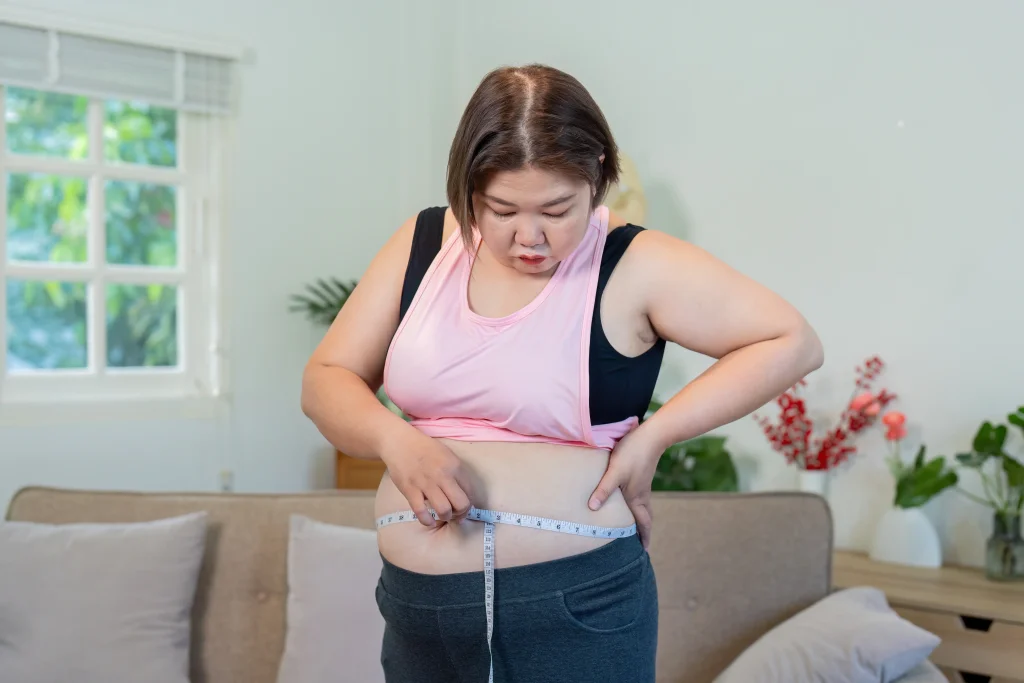

For many women, menopause feels like stepping into a completely different relationship with their body. A shift in energy. A softness around the waist that wasn’t there. A metabolism that doesn’t respond to the same routines. Clothes that fit differently even when your weight hasn’t changed.
And somewhere in all of that, a quiet, very human question arises:
“Why is my body changing… even though I’m doing everything I used to?”
If you’ve wondered this, you’re not alone. In fact, nearly 60–70% of women experience weight gain during menopause, especially around the midsection. And the reason isn’t a lack of effort; it’s physiology.
This article breaks down the REAL science behind weight gain during menopause, backed by research, explained gently, and framed with compassion because your body isn’t fighting you. It’s reorganizing itself.
Let’s begin with the truth most women don’t get told:
Weight gain during menopause is not a failure of willpower, it is a consequence of hormonal, metabolic, and neurological shifts that are biologically predictable.
Here’s what the science shows.
Estrogen does far more than regulate periods. It influences:
During perimenopause and menopause, estrogen levels fall sharply. Research shows that this decline triggers: Increased abdominal fat storage
(Even with no increase in calorie intake)
Studies from Mayo Clinic and The Endocrine Society confirm that low estrogen:
This is why women often say:
“I haven’t changed anything. My body has.”
Your body is literally reorganizing where fat is stored — and it’s not a choice you’re making.
After 40, women naturally lose muscle, a process called sarcopenia.
By menopause, this muscle loss accelerates due to sharp drops in estrogen and growth hormone.
Why this matters:
Muscle burns more calories than fat — even at rest.
Less muscle = fewer calories burned in a day
= weight gain even if your eating habits haven’t changed.
This is why countless women say:
“What used to work isn’t working anymore.”
Because the body they have now needs new strategies.
This is one of the most overlooked scientific reasons behind weight gain during menopause.
Declining estrogen makes cells less responsive to insulin.
This leads to:
Women often mistake these symptoms as “lack of discipline,” but they are neurological and hormonal responses driven by shifting insulin sensitivity.
Studies from Harvard and NIDDK show that post-menopausal women are significantly more prone to insulin resistance: a big reason behind midsection weight gain.
Hot flashes, night sweats, anxiety spikes, early waking…
Sleep during menopause can feel unpredictable.
Poor sleep affects:
In fact, research shows that even one night of poor sleep can disrupt blood sugar the next day.
So if you’ve noticed weight changes alongside sleep changes, it’s not a coincidence. It’s physiology.
When estrogen falls, your body relies more heavily on your adrenal system to maintain hormonal balance.
This often leads to:
Cortisol directly instructs the body to store fat around the abdomen, especially during stressful transitions.
And menopause is a transition.
This is the piece very few women ever hear about but it’s fascinating and important.
Estrogen affects:
When estrogen drops:
Not because you’re “losing control”
But because your brain is adapting.
You’re not weak. You’re rewiring.
Some women develop:
All connected to the interplay between estrogen and thyroid hormones.
This is why routine thyroid evaluation is recommended during menopausal transition.
Emerging research shows that fluctuating estrogen impacts:
This means weight changes aren’t always fat sometimes it’s fluid, inflammation, and slowed digestion.
Again… not your fault. Not your doing.
Weight gain during menopause is not a moral failure.
It’s biology, and it’s grounded in predictable, research-backed mechanisms.
Your body is transitioning from one hormonal era to another. Just like puberty was a beginning, menopause is a beginning too but in a different direction.
The goal is not to fight your body.
The goal is to understand and support it.
| What Helps | Why It Works (Backed by Research) | How to Do It |
|---|---|---|
| 1. Prioritising Protein (20–30g per meal) | Protein supports muscle maintenance, boosts metabolism, improves insulin sensitivity, and enhances body composition. | Include 20–30g protein each meal (eggs, tofu, yogurt, chicken, legumes). |
| 2. Strength Training (2–3× weekly) | Builds muscle, increases metabolic rate, and reduces visceral fat—highly effective for menopausal weight gain. | Use bodyweight, dumbbells, or resistance bands. Short home workouts count. |
| 3. Walking After Meals (10–20 minutes) | Lowers post-meal blood sugar, reduces belly fat, improves insulin response. Small habit → big hormonal impact. | Walk for 10–20 minutes after lunch or dinner. |
| 4. Balancing Blood Sugar Through Nutrition | Stabilizes appetite, reduces cravings, inflammation, mood dips, and belly fat storage. | Pair carbs with protein or fat; avoid long fasting gaps; choose slow-digesting carbs. |
| 5. Prioritizing Sleep | Good sleep regulates hunger hormones (ghrelin, leptin) and improves metabolism. | Magnesium glycinate, consistent sleep times, calming nighttime routines, fewer screens. |
| 6. Supporting Estrogen Naturally | Certain foods and herbs help with estrogen metabolism and adaptation during menopause. | Flaxseed, soy isoflavones, shatavari, black cohosh, red clover (not replacements for estrogen). |
| 7. Testing Thyroid & Key Vitamins | Thyroid shifts, vitamin deficiencies (D, B12, ferritin) can worsen weight gain or mimic menopause symptoms. | Check TSH, T3, T4, Vitamin D, B12, Ferritin regularly. |
| 8. Working With a Clinician | Some women need additional support beyond lifestyle changes—safe and effective options exist. | Discuss HRT, supplements, targeted nutrition, and personalized plans. |
The weight gain during menopause you’re experiencing is not random. It is not laziness. It is not a lack of control.
It is biology.
It is chemistry.
It is transition.
It is the body doing what millions of women’s bodies do recalibrate.
Your body isn’t closing a chapter.
It’s rewriting itself.
With knowledge, nourishment, community, and care, this can become not a season of loss but a season of profound renewal.
P.S. – Remember, you don’t have to navigate this transition alone.
At Miror, you have access to a compassionate panel of registered dietitians, GPs, and women’s health experts who understand menopause deeply, scientifically and emotionally.
You can book a free consultation anytime, get personalised guidance, and feel supported every step of the way as your body enters this new chapter.
Hormonal shifts especially declining estrogen—change how your body stores and burns fat. Even with the same diet and exercise, your metabolism, insulin sensitivity, and muscle mass naturally decrease, making weight gain more likely.
Yes. Research shows that estrogen decline causes fat to shift from hips and thighs to the abdominal area. This is a biological response, not a reflection of effort or discipline.
Absolutely. Strategies like strength training, balancing blood sugar, increasing protein intake, walking after meals, improving sleep, and addressing thyroid or vitamin deficiencies can all help manage weight during menopause.
Falling estrogen affects brain chemicals like serotonin and dopamine, which influence appetite and emotional eating. This can naturally increase cravings, especially for carbs and comfort foods.
If weight increases rapidly, feels impossible to manage, or is accompanied by fatigue, mood changes, hair loss, or irregular cycles, it’s wise to check thyroid levels, insulin resistance, vitamin deficiencies, and discuss options like HRT or medical nutrition therapy.



 ×
×

